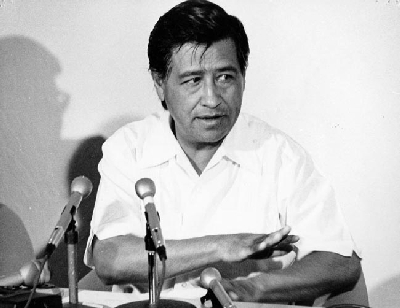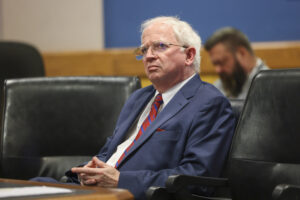United Farm Workers Strike Back at the L.A. Times
The UFW refutes allegations that it exploits the legacy of Cesar Chavez Update No 1: Read how it took three phone calls from a congressman and a former cabinet secretary before the LA Times would meet with the UFW 2: Check out an executive summary of the UFW's charges 3: Marc Cooper on the UFW's threat to sue him over a negative column he wrote 4: The L Times prints several corrections to the story.
On four successive days last month, the Los Angeles Times published a damning investigative series on the United Farm Workers, the nationwide agricultural union founded by Cesar Chavez 40 years ago.
Times reporter Miriam Pawel, the author of the series, asserted in the first article:
Thirty-five years after Chavez riveted the nation, the strikes and fasts are just history, the organizers who packed jails and prayed over produce in supermarket aisles are gone, their righteous pleas reduced to plaintive laments.
Today, a Times investigation has found, Chavez’s heirs run a web of tax-exempt organizations that exploit his legacy and invoke the harsh lives of farmworkers to raise millions of dollars in public and private money.
The money does little to improve the lives of California farmworkers, who still struggle with the most basic health and housing needs and try to get by on seasonal, minimum-wage jobs.
The series had substantial ripple effects, spawning columns across the country that condemned Chavez’s heirs for — in the words of the Times — treating “the Chavez legacy as an ATM.“
In the wake of publishing such a damning and accusatory piece on the United Farm Workers, you might expect the Los Angeles Times to readily agree to sit down with union officials and listen to their concerns about the story–if only for appearance’s sake.
But it actually took two weeks and three phone calls from a congressman and a Clinton-era cabinet secretary before L.A. Times Editor Dean Baquet acceded to the union’s request for an in-person meeting.
“[Baquet] was very reluctant to agree to sit down and meet with the representatives of the Farm Workers movement to hear their objections,”said Stephen Rivers, a communications consultant and former UFW staffer who helped arrange the meeting. “It was very unusual, given the major-hit-piece nature of the series, that they wouldn’t have the courtesy to agree to meet.”
Indeed, after Baquet ignored repeated requests for a meeting, Rivers reached out to Mickey Kanter, President Clinton’s secretary of commerce and U.S. trade ambassador, and a UFW official solicited the help of Rep. Howard Berman (D-Calif.), both of whom have a long history of working with the union. Rivers said both men called Baquet and urged him to schedule the meeting.
The process took almost two weeks, by which time the UFW had sent the Times its 101-page rebuttal to the series. (Separately, attorneys for the Farm Workers sent Times Publisher Jeffrey Johnson a 62-page letter demanding a retraction of the series.) UFW representatives met with Times personnel Jan. 31 at the paper’s downtown Los Angeles headquarters.
Present at the meeting were: union President Arturo Rodriguez; Dolores Huerta, who co-founded the union 44 years ago with Cesar Chavez; Paul Chavez, Cesar’s son, who runs the National Farm Workers Service Center, a sister organization of the UFW; longtime UFW spokesman and Cesar Chavez aide Marc Grossman; UFW political director Giev Kashkooli; and Rivers.
Present from the Times side were: Editor Baquet; Publisher Johnson; the series’ author, Miriam Pawel; and the series’ editor, Simon Li.
Rivers called the meeting “politely contentious,” but also acid-edged from the outset because, according to Rivers, Baquet started out by saying that he stood by the stories.
“If the idea of the meeting is that he’s going to hear you out, it’s very frustrating to be told that he’s already made up his mind before the meeting gets underway,” said Rivers.
Nevertheless, UFW officials tried to take the Times staffers and executives through “what we thought were the deep journalistic flaws in the pieces,” according to Rivers, “and also a number of cases where charges were leveled or stories told about farmworkers–and they were not asked to give their side of the story.”
Rivers said they even referred Baquet to a section of the L.A. Times’ own ethics policy specifying that subjects of stories should be given every opportunity to defend themselves against allegations or criticisms.
“For the most part they didn’t agree or disagree, they mostly heard us out,” said Rivers. “Baquet said ‘Thanks for coming, and if there are any factual errors, we will correct them.’ “
The Farm Workers representatives replied that the paper had a obligation to address not only the factual errors but the larger issues of fairness and balance in its reporting.
A spokesman for the Times characterized the meeting like this:
“We had a long, healthy conversation. We made it clear that we thought the UFW series was fine journalism. Their arguments did not change our view about our reporting.”
To date, the Times has not published any correction, clarification or editor’s note about the series. (On Feb. 12, 2006, The Times published several corrections to the story.
In perhaps unrelated news, Miriam Pawel, the series’ author, has accepted a buyout package to part ways with the Times. L.A. Observed quoted Baquet as saying that the buyout had “absolutely nothing to do with the UFW series. I thought it was a terrific piece of journalism, and her decision to leave came before publication of the story.”
The L.A. Observed piece continued: “In truth, the seeds of Pawel’s departure were sown after she lost her title as the assistant managing editor for Metro in 2004 and went back to reporting. I mentioned she was likely to leave back in the first post about the UFW stories on January 8. Newsroom speculation is that Pawel hopes to write a book, perhaps on the UFW.”
Executive Summary of the UFW’s Full Response

The Los Angeles Times Series on the United Farm Workers: A Disservice to Readers and the Farm Worker Movement
Introduction
For more than 40 years, the Los Angeles Times has covered efforts by Cesar Chavez and the UFW to represent and serve farm workers fully, fairly and accurately. Over the past 12 years, the Times has published dozens upon dozens of stories, written by at least 22 different reporters, chronicling the UFW’s significant efforts and successes in winning representation elections, boycotts, contracts, legislation, court rulings as well as other government actions — all in the service of representing farm workers.
Unfortunately, the paper’s recent series of stories by Miriam Pawel stands in stark contrast to the Times’ previous coverage. Although her articles have a veneer of fairness and accuracy, they in fact are far from that. The picture painted is a false and inaccurate one. This White Paper seeks to refute many of the falsehoods in the Times series. We are confident that any fair-minded person who reads both the articles and this document will conclude that the Times’ has done a great disservice to its readers, to the Farm Worker Movement, and to the truth.
The journalistic failings of the series are significant:
The Los Angeles Times Code of Ethics states, “People who will be shown in an adverse light in an article must be given a meaningful opportunity to defend themselves. This means making a good-faith effort to give the subject of allegations or criticism sufficient time and information to respond substantively.”
Yet in her stories:
- On at least 71 occasions, Miriam Pawel failed to ask the Farm Worker Movement about specific charges or allegations in her stories. Many involved serious criticisms.
- On at least 17 occasions, Miriam Pawel made false or inaccurate statements even though she knew the facts ahead of time.
- On at least 6 occasions, Miriam Pawel misrepresented quotes or statements in her articles, taking them out of context.
- On at least 31 occasions, Miriam Pawel omitted the Farm Worker Movement’s side of the story during important points in her coverage.
The first three days of Miriam Pawel’s stories — those concerning the present Farm Worker Movement — add up to about 388 column inches of text. Just 23 of those column inches — or roughly 5 percent of the three stories — can charitably be described as containing facts or perspective from the movement.
The series boils down to three major charges. All of them are false.
FALSE CHARGE: THE UFW HAS ABANDONED ORGANIZING FARM WORKERS
FACTS:
(1) Over the past 12 years, the Times has written extensively about a succession of UFW organizing and election campaigns in the fields.
(2) Workers at 32 companies voted for the UFW in secret-ballot elections since the mid-1990s.
(3) The UFW has signed important new union contracts with the largest strawberry, rose, winery, and mushroom firms in California and in the nation.
(4) As a result, dues money paid by Farm Workers under UFW contract nearly tripled from 1994 to 2004.
FALSE CHARGE: THE REASON FARM WORKERS REMAIN LARGELY UNORGANIZED IS THAT THE UFW HAS ABANDONED THEM.
FACTS:
(1) Despite significant obstacles, the UFW has in fact won new rights and important victories for farm workers in the fields, in the courts, in the state legislature, in the U.S. Congress, and in the governor’s office. Prior to its recent series, the Times extensively covered these UFW efforts in all these arenas. Bruce Raynor, President, UNITEHERE, as well as John Wilhelm, President, Hospitality Division, UNITEHERE, wrote to the Times prior to the series and noted “The UFW’s recent history shows remarkable success in the toughest organizing job in America”. The obstacles to farm worker organizing are enormous: fierce political and economic opposition by California Agribusiness, and 16 years of two progrower, anti-UFW Republican Governors between 1983 and 1999 (Rene Lopez, a 19 yr. old farm worker leader, was murdered by grower agents just after voting in a state conducted union election at Sikkema Dairy near Fresno in 1983). Most of today’s farm workers in California are much more vulnerable to abuse and threats because they are undocumented immigrants.
FALSE CHARGE: THE CHAVEZ FAMILY RUNS A WEB OF “FAMILY BUSINESSES” THAT DO NOT HELP FARM WORKERS BUT TRADE ON THE LEGACY AND NAME OF CESAR CHAVEZ AND THE UFW.
FACTS:
(1) All of the non-profit organizations have distinct missions, budgets, professional staffs, which provide vital services for farm workers in addition to the UFW’s work. Among those services are high-quality affordable housing in farm worker communities, an eight-station network of popular educational Spanish-language radio stations targeting farm workers and blanketing regions with the greatest concentrations of farm workers in the nation, classes to improve job skills and learn vocational English, and community organizing programs to help bring about basic social and economic change in rural ommunities.
(2) Chavez family members in the farm worker movement are paid — and live — modestly. Many spent decades working for next to othing. None profit personally in any way from the legacy of Cesar Chavez. Finally, it is sad the Times attempted to unfairly impugn the reputation and memory of Cesar Chavez, who dedicated his life to serving farm workers and all who are victims of poverty and injustice. The life and work of Cesar Chavez will remain an inspiration to millions of Americans long after the Los Angeles Times series has been forgotten.
THE FULL TEXT OF THE UFW WHITE PAPER ON THE LOS ANGELES TIMES SERIES, WITH SUPPORTING DOCUMENTS AND A SAMPLING OF THE HUNDREDS OF LETTERS OF SUPPORT AND TESTIMONY ABOUT OUR WORK CAN BE FOUND AT: http://www.ufw.org/puzzledLAT.htm
Your support matters…Independent journalism is under threat and overshadowed by heavily funded mainstream media.
You can help level the playing field. Become a member.
Your tax-deductible contribution keeps us digging beneath the headlines to give you thought-provoking, investigative reporting and analysis that unearths what's really happening- without compromise.
Give today to support our courageous, independent journalists.






You need to be a supporter to comment.
There are currently no responses to this article.
Be the first to respond.